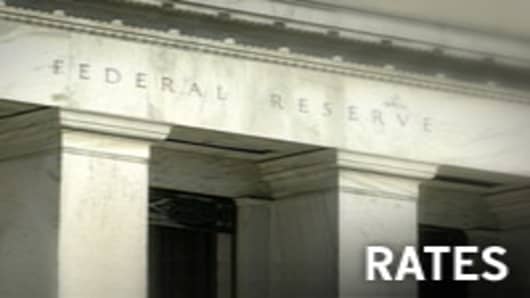The markets have worked themselves into a frenzy of navel contemplation about today's Fed meeting, and the "consensus" seems to be investors are collectively worried about Ben Bernanke & Co. sounding too hawkish.
Little matter that with most of the vital signs for the US economy continuing to deteriorate it would probably be viewed as "un-American" to raise interest rates right now. So what are the markets scared of?
We kicked this around in the office this morning, as well as on air and we struggled to understand why the market should buy into more jawboning. The currency markets bought the dollar verbal intervention, and the greenback enjoyed a brief period of gains. The market bought the Bernanke rhetoric about the risks of inflation and that shifted rate expectations and drove yields up. Now the markets are trying to decide whether they have been had. Can the Fed continue to convince the fixed-income trading desks that monetary conditions should be tighter without delivering a rise in benchmark rates?
Andrew Milligan, our guest from Standard Life Investments, made the point this morning that the equity investor should be more worried about policy mistakes from the central bankers of the emerging world than those in the developed one. If the developed world economies are moving into a low-growth phase with high input prices redistributing wealth to the commodity rich nations, then the emerging world growth will continue to be the driver of earnings. If these economies are strangled by tighter monetary policy then where can the equity investor go for inflation-beating returns?
So, we should probably be paying more attention to the Indian central bank's 50-basis-point hike, and the Chinese central bank's squeezing of the commercial banks reserve ratio requirements (an effective tightening of lending).
Since I am paid to be skeptical let me throw in a note of concern. The Fed understands its actions have global significance and, as Greenspan has done in the past, has shown a willingness to acknowledge risks in other geographical areas in its setting of domestic interest rates.
As the dollar is the reserve currency of the world it could hardly be any other way. There is also, I believe, a sense within the ECB and in a smaller way the BoE that domestic rates have an impact (often through trade) on the economies of other countries. At this stage it might be one step too far to ask the central bankers of the developing world to consider what is in the best interests of the global economy (or global investors) when they shape their own domestic monetary policy.
A further problem arises. Developed world central banks operate around free economies with freely-floating exchange rates. Most of the problems the developing world central banks are being asked to tackle are being created by restrictive economic policies and pegged exchange rates. Currencies are being held artificially low which is creating inflationary pressures -- but governments refuse to abandon pegs for fear of losing trade competitiveness and inducing slower growth.
Managed prices and incomes policies are distorting the profit motive and supply/demand curves particularly in the area of food and fuel. So, central bankers are being asked to set policy in spite of the constraints placed on them by their own governments.
These bankers have decided to deal with the inflationary bogeyman by pushing up the cost of money. This will cool growth. Rather than allow the global economy to rebalance through higher currencies and ‘real prices’ for goods, the likelihood is these tighter monetary conditions will induce a growth slowdown just as the developed world also rolls over
A Reader Writes
Dear Geoff, Good article on Europeans spend-to-no-end spree. Here at least in Michigan I have been going through cutbacks in not only my spending but our state spending since 2001.
To people my age and also of a lesser age group it is as if we here are reliving history dating back to 1929. As far as the US markets are concerned no one not even at CNBC knows where the bottom will be. I like to think that life in general will get better, but the U of M surveys tell a different story at least for the short term.
Steve P.
Detroit
Send feedback via the blog (click here) or directly to CNBC Europe.





